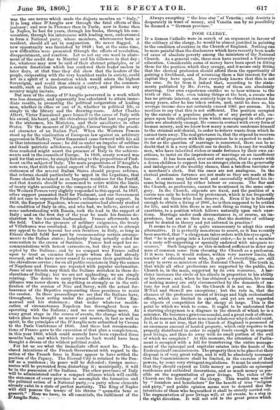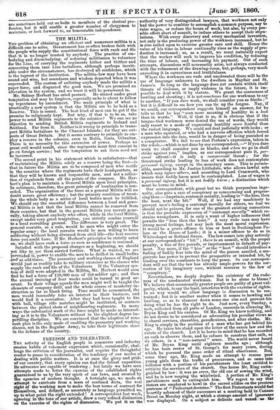POOR CLERGY.
IF a Roman. Catholic were in search of an argument in favour-of the celibacy of the clergy, he would be almost justified in pointing to the condition of curates in the Church of England. Nothing can be more painful than the disclosures which have recently been made of cases of absolute poverty among the ministers of the National Church. As a general rule, these men have received a University education. Considerable sums of money have been spent in fitting them for the position which they occupy, and it seems only fitting that the clerical profession should afford them the opportunity of gaining a livelihood, and of returning, them a fair interest for the capital they have spent. Now everybody knows that this is not the case. So far from it indeed ,thats according to the state- ments published by Mr. Jervis, many of them are absolutely starving. Our own experience enables us to bear witness to the truth of this. But, even taking things at the best, a curate who has no private interest, can scarcely, hope to obtain preferment for many years, after he has taken orders, and, until he does so his average income does not certainly exceed 1001. per annum. It is needless to say that this is not sufficient. The position occupied by the curate of a populous parish, or of any parish at all, im- poses upon him obligations from which, men engaged in other pur- suits are absolutely exempt. He comes in contact with every form of human misery, and we knew how many actuate condemns himself to the strictest self-denial, in order to relieve wants from which lie cannot turn away. The real grievance is, that the stipend he receives is out of all proportion with the appearance he is expected to make. So far as the question of marriage is concerned, there can be no doubt that it is a very difficult one to decide. It is easy for wealthy men, who have inherited riches or made fortunes by their own ex- ertions, to insist on the imprudence of marriage-on an insufficient income. It has been said, over and over again, that a curate with a dozen children to support has no strongerolaim on the generosity and indulgence of the wealthy classes, than a brieflesa barrister or a merchant's clerk. But the cases are not analogous. In the clerical profession fortunes are not made as they are made at the bar. A curate may labour well and successfully without his in- come being increased by either labour or success. The Bar and the Church, as professions, cannot be mentioned in the same cate- gory. In the Church, stipends are fixed, and the position of a curate can only be bettered by preferment, which is too frequently bestowed on those who least deserve it. Even if he is fortunate enough to obtain a living of 2001., he is then supposed to be settled for life, and with him there is no suoh thing as rising by his own exertions, to a position which follows naturally upon such exer- tions. Marriage under such circumstances is, of course, an ins- prudence, but are we then to say, that the doctrine of celibacy must be denied in theory and yet enforced in practice ? It seems to us that it is quite unnecessary to adopt this oruel alternative. It is perfectly monstrous to assert, as it has recently been asserted, that " a clergyman takes orders with his eyes open • " that "he is not going into a Levitical order,—he is not a member of a caste self-supporting or specially. endowed with adequate re- sources." Such language as this is indeed sufficient to deter any man of common sense from choosing the Church as a profession. If it were true, it would reduce, within very narrow limits, the number of educated men who, in spite of everything, are still ready to serve as ministers of the National Church. The truth is, that while all other professions are supported by the public, the Church is, in the main, supported by its own resources. A bar- rister increases the circle of his clients in proportion to his ability or his success ; and, when he has obtained a reputation, his means of making money are only circumscribed by the demands of na- ture for rest and food. In the Church it is not so. Men like M'Niel and Stowell are exceptions ; but the rule is, that the chances of the profession consist of livings and high ecclesiastical offices, which are limited in eXtent, and yet are not regarded as objects of competition for the clergy at large. This is the point to which we wish to come. It ought to be understood that a starving clergyman is a disgrace to the church of whieh he is a minister. He becomes a grievous scandal, and a great rook of drone..
And the reason is, that there is no need whatever why it should exist.
Is it, or is it not true, that the Church of England is possessed of an enormous amount of landed property, which only requires to be properly. distributed in order to supply funds enough to augment
poor livings, and thus do away with no small portion of the evil of which we complain ? At this moment, the attention of Parlia- ment is occupied with a bill for transferring the entire manage- ment of the episcopal and capitular into nto the hands of the Ecclesiastical Commissioners. The property then toile placed at their
disposal is of very. great value, and it wili be absolutely necessarythat the Commissioners shall be limited, in the exercise of their powers, by some very stringentregulations. It must be understood that they should expend as little money as possible on episcopal residences and cathedral decorations, and as much money as pos- sible on the augmentation of poor livings. The riches of the Church are the heritage of the clergy. This wealth was willed by"founders and benefactors" for the benefit of true "religion and piety," and public opinion seems now to demand that the intentions of those who bequeathed it shall be strictly carried out. The augmentation of poor livings will, at all events, be a step in the right direction. It will not add to the great prizes which
are sometimes held out as baits to members of the clerical pro-. fession, but it will enable a greater number of clergymen to maintain, or look forward to, an honourable independence.



























 Previous page
Previous page